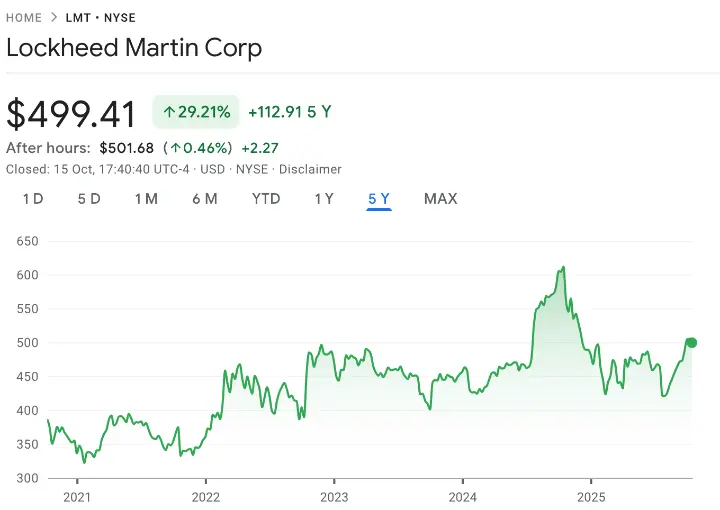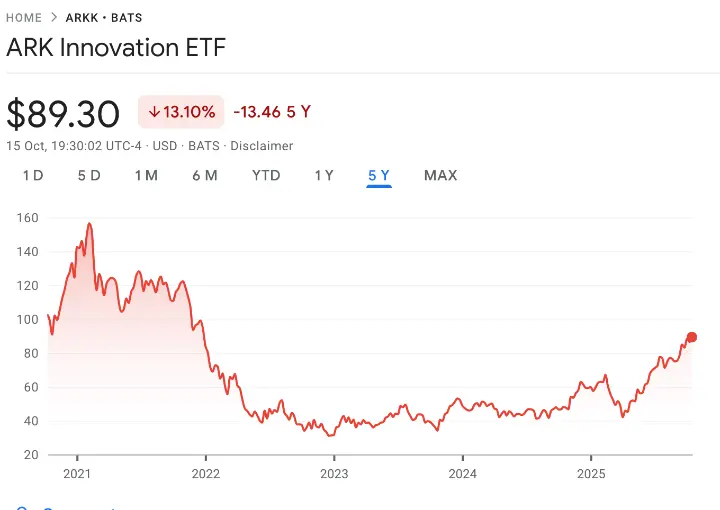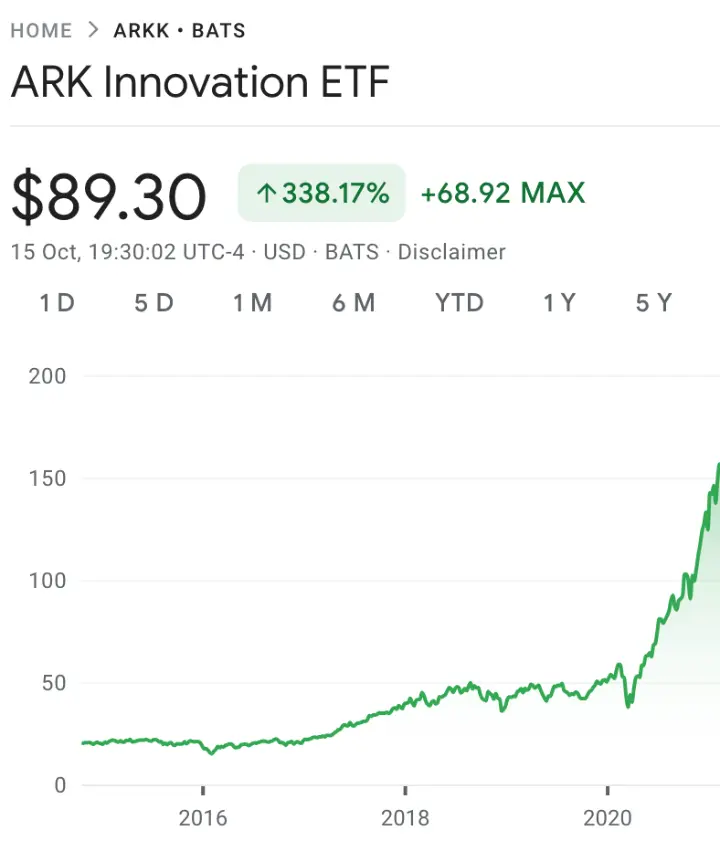I'll borrow an idea from the stock market and clumsily apply it to life in general. Now, I'm willing to accept that this might only hold true for a slightly autistic engineer like myself, but I'm hoping it will have applications beyond just my limited perspective on life - and hopefully into yours.
Like all good advice, it should be taken; literally, at face value, with no thought to context and without limitations or caveats.
Let's dive in.
Stock Market Volatility
If you are a giant nerd, you can actually measure historic volatility by doing statistics on the chart of a stock. But to save you some time, I'll just show you two very revealing stock charts. Ignoring the ethics of selling guns for a minute, let's just analyse the stock performance of LMT:

So this first one has a 5-year low of around $321, and a high of $611. So basically you can see the difference between the min and max price in this time period is not even double.
Compare this to the wonderfully volatile ARK innovation fund:

Phew! In the same time period, it has a low of about $31, and a high of $156. So in that same time period it has gone almost 5X between the lowest and highest price.
I know I said "historic" volatility, but realistically that's all you can ever compute. It is, in a sense, how much the price has varied over that time relative to it's price. You can't cheat here and say that a stock priced at $1000 that moved plus or minus $100, is more volatile than a stock priced around $100 that goes plus or minus $50.
The first of these, while actually having a larger range in dollar amounts, when converted to a percentage is only moving by around 10% of the average price, whereas the second is more like 50%.
This is a gross oversimplification that is likely to have quants frothing at the mouth to correct me, but the point remains valid. We tend to assume that historically volatile stocks will continue to be volatile in the near future, and so we can drop the "historical" part and just refer to this as volatility.
So in a nutshell, ARK is more volatile than LMT, in that we expect the price swings to be much greater in the near future (as a percentage of the stock value), because that's what has been happening up to this point in time already.
Risk vs Reward
This plays into this idea of risk and reward. In other words, volatility is a two way street. If we take an asset that has done this:

It looks pretty tasty, and you think to yourself, "I'd like a piece of that action!" The more observant of you (well done!) will notice that in fact this is the SAME ARK innovation fund, that we also know will eventually drop to a low of $31 dollars not long after this chart has been chopped off.
So basically, if something can go up really really fast, then it can also go down really really fast.
So is volatility good? Unsatisfactorily, like all things in life, it depends. Volatility is good if you want to grow your portfolio quicker, but bad if that growth turns to ashes and leaves you with massive losses on the books.
Sometimes you want that opportunity, and you are willing to take the risk, and sometimes you really don't, and you'd rather stick.
How to use this idea in life
So how do we cultivate this into a life strategy?
Well you have all sorts of areas of your life. You have work, education, family life, hobbies, you might want to start a business. You have lots of competing ideas and projects, all vying for your precious and limited attention.
Most people (of course) want all the areas of their life to zoom up concurrently. If you could wave a magic wand, why wouldn't you? But here's the thing - opening up the potential up-side of an opportunity also exposes you to the potential down-side risk.
Now, unlike stocks, you are not simply at the mercy of the market, hoping it goes the way you want it to. In life you actually have some control over projects and their outcomes, by how disciplined you are, how persistent, how competent and so on. So when you embark on a new project, filled with the naive optimism you always find at the bottom of mount stupid, you are of course expecting this project to be a roaring success. BUT, you must be aware, that you are destabilising that area of your life as well, and opening yourself up to the humbling experience of falling flat on your face, again.
So the way I try to control the down-side risk of new projects, is opting for stability in other parts of my life. If you have volatility in all areas of your life simultaneously, then you are of course hoping that they all go up. But to advance all these projects at the same time will drain all of your resources, and is probably beyond your capacity to do it.
Whereas if you have stability in most areas of your life, (which means unlikely to get worse, but also unlikely to get better), then you can open up one of the areas for growth, give that your full attention, and give yourself a much better chance of success. Hurrah!
Examples please
Still haven't got what I'm talking about? Well maybe you are too distracted by all your life challenges to wrap your head around it. Don't worry, I'll give some examples of how to apply this, and also how not to apply it.
These are the types of things that can bring volatility in your life:
Getting a new job
Better the devil you know, as they say. A new job can mean better salary, new opportunities, a chance to expand your network. But it can also contain potential landmines, maybe the commute turns out much worse, or your boss or an influential person in another team turns out to be a massive a-hole (I'm naming no names, but you know who you are!).
Staying in the same job obviously means your chances for improvement are limited, but you probably know what you're going to get as well.
Getting a new relationship
The grass is always greener on the other side, as they say. A new relationship can be exciting, but there are no guarantees it will be better than the old one. (There's actually a very interesting piece of maths to optimise this problem, more on that later!), but basically it's easy to imagine that someone else will not have the things you don't like about your current partner, but of course they will likely have their own things that you will also come to dislike about them.
Starting a business
This can bring many challenges, as anyone who has been in the trenches will know. We all think our new business venture will be a success, but it can also take you out of your depth, and be extremely challenging as you have to acquire new skills and keep your head afloat at the same time.
Moving countries
Do I really need to continue? Haven't you got the point yet?
The balancing act
So my suggestion then, is to balance things in life. If you are planning on starting a new hobby, maybe don't change jobs at the exact time. In fact, hold off on emigrating to a tropical island, having a baby, switching careers and taking up public speaking all in the same week.You might find yourself more successful if you keep some areas of your life boring and predictable, so you don't have to think too much about them. Sometimes boring is good. It frees you up to solve other problems.
Once a new project is up and running, and is stable, you can lock-in the lower volatility there, pause your ambitions temporarily, and take your attention off that project to focus on something else.
This way you can now dedicate yourself to another area of life, and give that a boost, get it stable, lock it down, and rinse and repeat.
Life can be a confusing mess at times, (ok I admit it, all the damn time), so try and contain the confusion to certain areas so you can manage it that bit better.
I hope this helps. If it doesn't, I take zero responsibility for that - your mileage may vary.